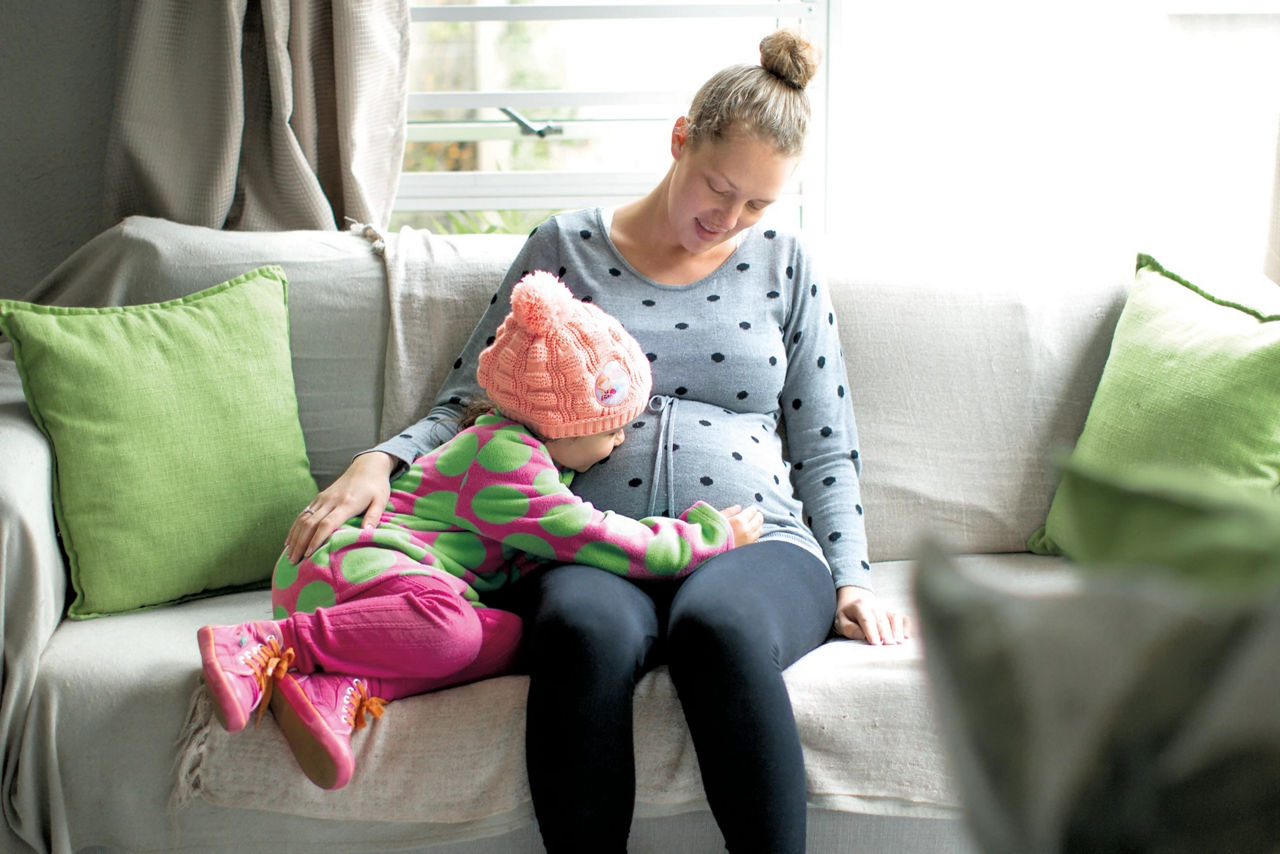Free weaning plan - Register here
Maternity Pay and Leave
When it comes to maternity leave, your entitlements as a mum today are better than ever before. And that means it’s easier to spend more stress-free time preparing for and bonding with your little one.
Alongside the excitement of having a new baby, it’s important that you feel financially secure so that you can focus all of your energies into looking after the new arrival. But that doesn’t necessarily mean the guidelines for your maternity leave are straightforward. Many mums find getting to grips with their maternity pay quite stressful. It can be a confusing topic, so try and read up on your maternity rights before the time comes so you know everything is in place.
In addition to understanding all of your maternity rights, it’s also perfectly natural to feel nervous and a little unsettled about taking maternity leave from your job. For some mums-to-be, leaving the office on your last day of work (hopefully armed with plenty of leaving presents!) feels fantastic, whereas for others, being away from work is a big step. There is no rule book for how you might feel, and there is no right or wrong answer: however you are feeling is perfectly natural!
To help the process run a little smoother, it’s important you understand exactly what you’re entitled to be paid during your maternity leave. If you’re new to the topic, you’re not only entitled to maternity leave, but also maternity pay or maternity allowance, which is a benefit you might be eligible for. In this guide we will run through your maternity rights.
What is maternity leave?
If you’re a pregnant mum with a job (an employee) you have the right to 52 weeks maternity leave (time away from work to focus on being a mum). This is referred to as Statutory Maternity Leave. It’s called this because you are legally allowed to have 52 weeks (1 year) off work, and during this period you have a range of rights which you can request from your employer. These include having flexible working arrangements if you decide to return to work at the end of your leave. Statutory Maternity Leave is different from maternity pay, but we’ll come to that after.
How long is maternity leave and when does it start?
At the moment, all pregnant mums qualify for Statutory Maternity Leave of up to 52 weeks. It’s best to view your maternity leave in two parts: the first half covers the first 26 weeks and is known as ‘Ordinary Maternity Leave’. The second 26 weeks of your leave is called ‘Additional Maternity Leave’.
You don’t have to have been at your job for donkey’s years to be entitled to maternity leave - there is no minimum length of service required for you to take it. You can start your maternity leave up to 11 weeks before your baby is due. Or, if you would rather have more time with your baby when they’re born, you could work right up until your due date and take the full amount afterwards.
You are under no obligation to take your full maternity leave entitlement if you don’t want to. But legally, you have to take at least 2 weeks compulsory leave after your baby is born, or a minimum of 4 weeks if you work in a factory.
How to get your maternity leave
Whatever your final choice, it’s really important that you notify your employer in writing at least 15 weeks before your little one is due. They may notice you are pregnant before this time, but it’s up to you if you want to confirm this.
When notifying your boss about your maternity leave you need to tell them:
- That you are pregnant (whoop whoop)!
- Your expected due date. If it’s too early to tell, give them the expected week. If you need help determining this, your doctor will be able to help. Your employer may even ask for a medical note to confirm you are pregnant.
- When you will be starting your maternity leave. This can normally be any date after the beginning of the 11th week before the baby is due.
What maternity pay am I entitled to?
In the same way you have Statutory Maternity Leave, you also have Statutory Maternity Pay (often shortened to SMP). Although you’re entitled to 52 weeks Statutory Maternity Leave, unfortunately you'll only get maternity pay for 39 weeks.
You are entitled to Statutory Maternity Pay (SMP) if:
- You have been working continuously for one company for at least 26 weeks, ending with the 15th week before your due date.
- If you earn £116 a week on average (which is equal to the lower earnings limit for National Insurance contributions).
Statutory Maternity Pay (SMP) is payable for 39 weeks. For the first six weeks you will be paid 90 percent of your average weekly earnings. For the following 33 weeks you will be paid at the Statutory Maternity Pay rate or 90 per cent of your average weekly earnings, whichever is lower. SMP is paid in the same way as your wages (for example, monthly or weekly). Tax and National Insurance will also be deducted from this as they are from your normal paycheck.
A lot of this might sound a little daunting and rather confusing. Don’t worry, there is plenty of information online. For more info on how to qualify for your Statutory Maternity Pay, visit GOV.UK or speak to your employer - they’re normally very happy to help you!
What is contractual maternity pay?
Your employer may offer contractual maternity pay that is more than the Statutory Maternity Pay. Your employment contract will have details of whether or not you are entitled to contractual maternity pay, but don’t worry, contractual maternity pay will never be less than Statutory Maternity Pay.
Sometimes within an employer’s contractual maternity pay there might be a legal rule that requires you to repay some, or all, of your maternity pay if you do not return to work. So if you are entitled to contractual maternity pay, it’s really important you understand all of the finer details.
Am I entitled to Maternity Allowance?
If you are pregnant but not eligible for SMP or contractual maternity pay, you might qualify for Maternity Allowance. For you to qualify for this benefit, you need to have been in your job or self-employed for 26 weeks out of the 66 weeks before your due date. Alternatively, you could be entitled to Maternity Allowance if you earned at least £30 a week, on average, over any 13 of those 26 weeks. You can claim this for a maximum of 39 weeks. Your local benefits office will be able to help you claim.
For more information on Maternity Allowance, visit GOV.UK - Maternity Allowance.
Why it's good to use your maternity leave
Maternity leave is an important time for new mums. It gives you the chance to recover from your pregnancy and childbirth. You will need it! It also gives you invaluable time to bond with your baby and learn how to look after them in a safe and loving environment. The first few days, weeks and months you spend with your little one are truly precious, so take full advantage of the maternity leave you’re entitled to.
How does maternity leave affect your other employment benefits?
When you are on maternity leave you are still eligible for any benefits you'd usually get if you were working as normal. This includes things like pension contributions and private healthcare. Even your holiday time should be counted up as normal. So don’t be distracted from spending time with your baby worrying about what you might be losing out on. Just enjoy the time you have with your little one.
Working in a safe environment during pregnancy
It’s really important that you feel safe and comfortable when you’re at work and either pregnant or breastfeeding. Your employer must carry out a risk assessment of your role and ensure that you do not have to work with hazardous chemicals, lift heavy loads, work in extreme temperatures, work long hours or stand for long periods of time. It’s really important you take good care of yourself!
If your employer can't make your work conditions suitable, they have to give you time off on full pay, no matter how long you've been working there. Don’t feel pressured into taking risks or working in an unsafe environment – your baby and your health are what matters most.
What about antenatal appointments?
If you need time off for any antenatal appointments during working hours, you’re entitled to be paid for the time. This even includes relaxation sessions if that's what your doctor or midwife has advised. So don’t let work be an excuse for not switching off or attending your classes!
Please note:
The information above is intended to be used as a guide only. If you would like further information on your maternity rights, please visit direct.gov.uk.
Maternity pay for teachers
If you’re a teacher, then you have slightly different rights regarding maternity leave and maternity pay. All teachers, regardless of how long they’ve been in their current job, are entitled to 52 weeks maternity leave.
Teachers who meet certain requirements are entitled to 39 weeks maternity pay at the following rates:
- 4 weeks at full pay
- The next 2 weeks - 90% pay
- The next 12 weeks – 50% pay
- The next 21 weeks – Statutory Maternity Pay
The requirements may change from time to time, so it’s best to check the latest guidelines from your union for the most up-to-date information.
Got a question about your maternity rights?
Remember, if you'd like to know more about your maternity rights, SMP or how much leave you are entitled to, you should either speak with your employer or visit Gov.co.uk; they also have a very useful maternity pay calculator.

Join our baby club
Ready to stop worrying about what other people think and do what feels right to you? We’ll give you the support you need to follow your instincts and enjoy parenthood to the max:
Helpful emails
Non-judgemental support
Free weaning plan
Tips from real parents
More from pregnancy
Pregnancy topics
Need free advice with a smile? Get in touch with our dedicated Care team.
Ask us a question (8am - 8pm Monday to Friday, 10am - 4pm Weekends)
Messenger
Contact us on Facebook (10am - 10pm, 7 days a week)
Call us
Call us on 0800 977 8880 (8am - 8pm Monday to Friday)
FAQs
Get answers to your most frequently asked questions




